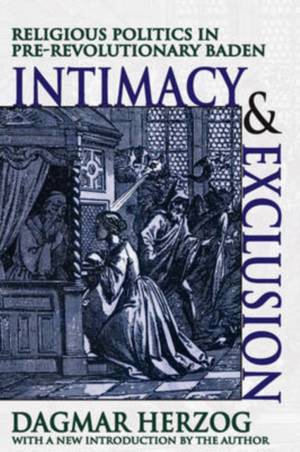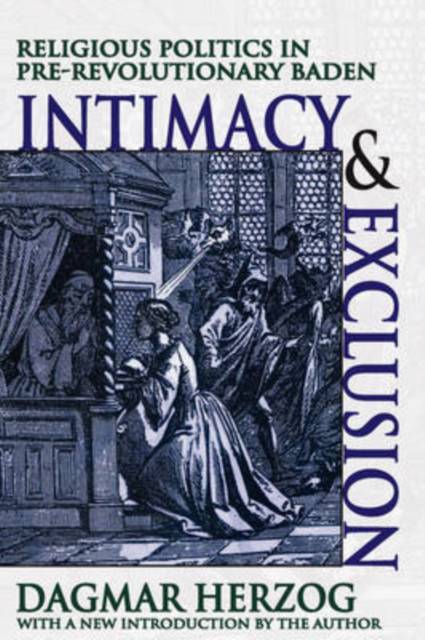
Bedankt voor het vertrouwen het afgelopen jaar! Om jou te bedanken bieden we GRATIS verzending (in België) aan op alles gedurende de hele maand januari.
- Afhalen na 1 uur in een winkel met voorraad
- In januari gratis thuislevering in België
- Ruim aanbod met 7 miljoen producten
Bedankt voor het vertrouwen het afgelopen jaar! Om jou te bedanken bieden we GRATIS verzending (in België) aan op alles gedurende de hele maand januari.
- Afhalen na 1 uur in een winkel met voorraad
- In januari gratis thuislevering in België
- Ruim aanbod met 7 miljoen producten
Zoeken
Intimacy and Exclusion
Religious Politics in Pre-Revolutionary Baden
Dagmar Herzog
Paperback | Engels
€ 96,45
+ 192 punten
Uitvoering
Omschrijving
In this pathbreaking work, Dagmar Herzog situates the birth of German liberalism in the religious conflicts of the nineteenth century. During the years leading up to the revolutions of 1848, liberal and conservative Germans engaged in a contest over the terms of the Enlightenment legacy and the meaning of Christianity--a contest that grew most intense in the Grand Duchy of Baden, where liberalism first became an influential political movement. Bringing insights drawn from Jewish and women's studies into German history, Herzog demonstrates how profoundly Christianity's problematic relationships to Judaism and to sexuality shaped liberal, conservative, and radical thought in the pre-revolutionary years. In particular, she reveals how often conflicts over the private sphere and the "politics of the personal" determined larger political matters.Herzog documents the unexpected rise of a politically sophisticated religious right led by conservative Catholics, and explores liberals' ensuing eagerness to advance a humanist version of Christianity. Yet she also examines the limitations at the heart of the liberal project, as well as the difficulties encountered by philo-Semitic and feminist radicals as they strove to reconceptualize both classical liberalism and Christianity in order to make room for the claims of Jews and women. The book challenges fundamental assumptions about processes of secularization and religious renewal and about Jewish-Christian relations in German history.
Specificaties
Betrokkenen
- Auteur(s):
- Uitgeverij:
Inhoud
- Aantal bladzijden:
- 266
- Taal:
- Engels
Eigenschappen
- Productcode (EAN):
- 9781412807029
- Verschijningsdatum:
- 15/12/2007
- Uitvoering:
- Paperback
- Formaat:
- Trade paperback (VS)
- Afmetingen:
- 152 mm x 229 mm
- Gewicht:
- 394 g

Alleen bij Standaard Boekhandel
+ 192 punten op je klantenkaart van Standaard Boekhandel
Beoordelingen
We publiceren alleen reviews die voldoen aan de voorwaarden voor reviews. Bekijk onze voorwaarden voor reviews.









